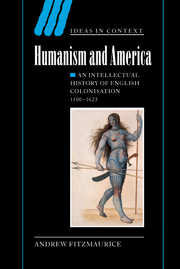Book contents
- Frontmatter
- Contents
- Acknowledgements
- 1 Introduction
- 2 The moral philosophy of Tudor colonisation
- 3 The moral philosophy of Jacobean colonisation
- 4 Rhetoric – ‘not the Words, but the Acts’
- 5 Law and history
- 6 The Machiavellian argument for colonial possession
- 7 Conclusion
- Bibliography
- Index
- IDEAS IN CONTEXT
4 - Rhetoric – ‘not the Words, but the Acts’
Published online by Cambridge University Press: 22 September 2009
- Frontmatter
- Contents
- Acknowledgements
- 1 Introduction
- 2 The moral philosophy of Tudor colonisation
- 3 The moral philosophy of Jacobean colonisation
- 4 Rhetoric – ‘not the Words, but the Acts’
- 5 Law and history
- 6 The Machiavellian argument for colonial possession
- 7 Conclusion
- Bibliography
- Index
- IDEAS IN CONTEXT
Summary
THE FOUNDATION OF COMMONWEALTHS
One of the clearest indications of the humanist education of those authors concerned with the New World was that their treatises promoting the colonial designs were composed according to the conventions of classical rhetoric. They were, that is, instances of classical oratory. Of the five disciplines in the humanist curriculum, rhetoric held a central position. The art of rhetoric was defined variously by classical and humanist authorities but always as an act of persuasion. Humanist culture, sometimes referred to as rhetorical culture, placed great emphasis upon the contingency of knowledge. In such an environment, in which knowledge was a matter of plausibility rather than certainty, the ability to persuade was crucial to social and political action. In the studia humanitatis the active life of the citizen was represented as vital to the health of the political community. Speech, in particular, was believed in its various forms, including writing and printing, to be one of the most important means through which to pursue action.
Classical rhetoricians and their Renaissance imitators distinguished three genera, or kinds, of rhetoric; the forensic, epideictic and deliberative. Each genus was distinguished by a context, a function and an end. The context of forensic rhetoric was the law court; its function was accusation and defence and its end, justice. Epideictic, or occasional, oratory, had its genesis in the funeral oration; its functions were praise and blame, and its ends fortune and virtue.
- Type
- Chapter
- Information
- Humanism and AmericaAn Intellectual History of English Colonisation, 1500–1625, pp. 102 - 136Publisher: Cambridge University PressPrint publication year: 2003



